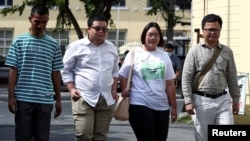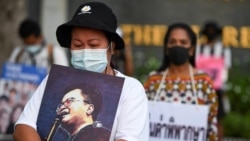A top court in Thailand last week ruled that a trio of activists at the vanguard of a youth-led movement to rein in the power and wealth of the country’s monarchy had breached the constitution, which holds the king to be inviolable.
The defendants — Arnon Nampa, Panupong “Mike” Jadnok and Panusaya “Rung” Sithijirawattanakul — unveiled a list of proposed reforms at a rally in Bangkok on August 10, 2020. They say their aim is to bring the country’s increasingly powerful monarchy in line with democratic norms and have denied any intent to see the institution abolished.
But in a decision broadcast on television November 10, the Constitutional Court said the 10-point list of reforms the activists unveiled aimed not at reform but held “hidden intentions to overthrow the constitutional monarchy.”
The justices said those intentions were inherent in “any actions that seek to undermine or weaken the institution.”
The court’s ruling, which carried no penalties, drew swift and strong rebuke online. The day after the court’s decision, Deputy Prime Minister Wissanu Krea-ngam warned protesters to “be more careful in future rallies” in light of the verdict.
Undeterred, thousands of Thais marched through the streets of Bangkok Sunday repeating their calls for reform of the monarchy, denouncing the court ruling and burning straw effigies of the nine justices.
The reform movement has shattered a generations-old taboo against any criticism of Thailand’s monarchy, which can carry a 15-year prison sentence.
By stifling open debate on reform, the ruling will only aggravate one of the most volatile fault lines running through Thai society, said Titipol Phakdeewanich, dean of the political science faculty at Thailand’s Ubon Ratchathani University.
“The court almost like closed the door for discussion on the issue relating to the institution of the monarchy because the court defined the demand for reform as unconstitutional,” he told VOA.
As a consequence, he added, “I think it would actually deepen the existing divisions between the conservative groups and the liberal groups in Thailand.”
Those divisions have fueled more than a year of protests in Bangkok met by pushback from conservative groups determined to preserve the monarchy’s pride of place in Thai society and waves of arrests and criminal charges against rallygoers. Rights groups says more than 150 people have been charged with defaming the royal family since August 2020.
In a November 11 statement, human rights group Amnesty International’s deputy director of research for the region, Emerlynne Gil, called the ruling “a dangerous warning to hundreds of thousands of Thais who want to express their opinions or legitimate criticisms of public figures or institutions.”
And while last week’s verdict carried no penalties, Gil said it could clear the way for charges of sedition and treason against the three activists and others.
“The situation in Thailand now is a really hard moment for the freedom of expression. After the statement from the Constitutional Court, I can say that we don’t have the freedom of expression anymore,” Rangsiman Rome, a lawmaker for the progressive opposition Move Forward party, told VOA.
He said the court ruling will do nothing to salve the deep-seated grievances many Thais have with the monarchy, or with the government they blame for shielding it from reform, and only make it harder to find a peaceful resolution.
“For me, when we talk about democracy, it’s not just [that] the power belongs to the people, but it means we can have some mechanism to talk, to discuss, we don’t have to use the violence to fight out the problem,” he said. “But this way, it looks like one side wins and the other side has to be silent. So, I cannot imagine how can we figure out the problem now.”
A spokesman for the government did not reply to VOA’s requests for comment.
However, at the United Nations Human Rights Council’s universal periodic review of Thailand’s rights record on November 10, the same day as the court’s verdict on the three activists, the government defended the monarchy’s authority and the administration’s use of the royal defamation law to preserve it.
“It reflects the culture and history of Thailand, where the monarchy is one of the main pillars of the nation, highly revered by the majority of Thai people,” Nadhavathna Krishnamra, the Foreign Affairs Ministry’s head of international organizations, told the council.
“Its existence is closely linked to safeguarding the key national institutions and national security,” he added.
Many Thais do still revere the royal family as semi-divine and the linchpin of Buddhism as the country’s national religion.
But Titipol of Thailand’s Ubon Ratchathani University said the reform movement is riding a wave of generational change. And while last week’s verdict may scare some reformists off the streets for a while and slow the movement down, he added, calls for change will only keep growing.
“I don’t think it is possible to stop this demand,” he told VOA. “In the long term, you cannot change the way people think. If we look at the future of Thailand now, younger generations are growing up and they have [a] different thinking process, different perceptions [of] the world. Once these generations grow up, Thailand might be different.”





